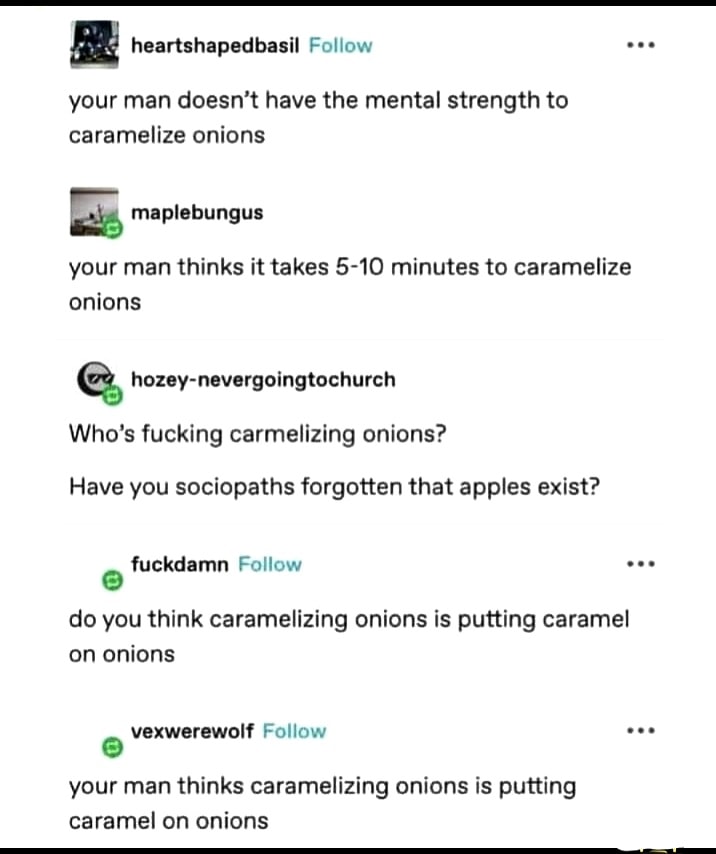this post was submitted on 21 Oct 2024
1276 points (98.0% liked)
Microblog Memes
6915 readers
1170 users here now
A place to share screenshots of Microblog posts, whether from Mastodon, tumblr, ~~Twitter~~ X, KBin, Threads or elsewhere.
Created as an evolution of White People Twitter and other tweet-capture subreddits.
Rules:
- Please put at least one word relevant to the post in the post title.
- Be nice.
- No advertising, brand promotion or guerilla marketing.
- Posters are encouraged to link to the toot or tweet etc in the description of posts.
Related communities:
founded 2 years ago
MODERATORS
you are viewing a single comment's thread
view the rest of the comments
view the rest of the comments

Y'all, pinch of baking soda and you'll have caramelized onions in no time flat. It's amazing.
I tried "velveting" some beef the other day (basically marinating the meat in baking soda) and the result was absolutely disgusting, both in terms of texture and flavor. I wonder if maybe I didn't wash off the baking soda sufficiently and got soap, although that wouldn't explain the texture issue. The texture was similar to Chinese takeout beef but somehow not as palatable.
Use cornstarch for velveting, and not much, and don't rinse. I wouldn't use baking soda to tenderize either, acids are the way to go, or just cooking it for the time it needs.
What were you making that called for baking soda?
I've never had it break them down too much, nor create anything remotely soapy in flavor. Perhaps it chemically does create soap, I don't know. But the end result is delicious and I'm a fifth the time.
Oh wow, yeah, that's never happened to me. Green? How much did you put in?
Wait now, what? I wish to know more.
Yep, it's jump starting a process key to flavors we all like called the Maillard Reaction
E: guess I'm technically correct about baking soda speeding up caramelization, but not in regards to what the Maillard reaction has to do with caramelizing. Whoops.
Maillard browning is not caramelization. Maillard is an insanely complex mess of different chemical reactions involving proteins, while caramelization is just sugar and heat.
Alkalinity speeds up the Maillard reaction significantly. Baking soda. Magic.
I agree, but the comment above recommends using it to caramelize onions. Maillard reactions can happen to onions for sure but the result of that is not caramelized onions.
Not to say baking soda couldn't help, I don't know the exact chemistry behind this stuff, but I do know that onion + maillard reaction does not yield caramelized onions
Huh, I guess I'd never really looked into the chemistry behind the distinction (which is strange because i am a chemist that loves food), but Maillard reactions involve the proteins, while caramelization involves the sugars. Though both are examples of nonenzymatic browning.
The good news is that the wiki page for caramelization says that either acidic or basic conditions speed up the caramelization processes, so i think we're good to go in either front!
Yeah, that's interesting. It's right in the name, too. You are caramelizing the sugars, not the proteins.
So the baking soda does speed up what little maillard is going on, so it browns faster, but it doesn't caramelize faster.
TIL!
I usually do overnight large batch caramelizing so it hasn't mattered. Big bag of onion cubes in the freezer so I never do it in a pan.
On that note, try adding a little splash of balsamic vinegar to caramelized onions 👌👌
Oh shit. That is so cool! I knew lye was used in making pretzels, but i didn't know it was to get the Maillard browning to happen faster. The wiki page says that one way to reduce the formation of acrylamide, a carcinogen, is by adding carbon dioxide, which ~~is actually released when baking soda is dissolved in water~~ will be released during cooking (edit: see reply chain below for discussion on this point)... IDK for sure if it's enough to really help, but I'm gonna just roll with it and say it is because delicious food is delicious.
Baking powder releases carbon dioxide. Baking soda just creates aqueous bicarb ions and a more basic solution (which is the key to a faster reaction).
Heating a solution of aqueous bicarbonate will release carbon dioxide, too. But since we have delicious onions and stuff in there too, let's walk through my thought process: Baking powder is baking soda + weak acid + cornstarch (to prevent premature reaction). Since the speed-up for the Maillard reaction works by deprotonating amino groups to make them more nucleophilic, the acid-base reaction that releases CO~2~ when using baking powder will still occur with just baking soda + food (ie: the protiens in the food are acting as the acid). You're probably right that using baking powder would produce more CO~2~, or at least produce it faster, but reducing carcinogenic side products for Maillard reactions via CO~2~ is a low-priority concern for me anyway. Just a fun curiousity that occured to me when reading the wiki page!
Sorry if my carbon dioxide subscripts don't work. I don't think my client supports all the fancy markdown, but i tried my best.